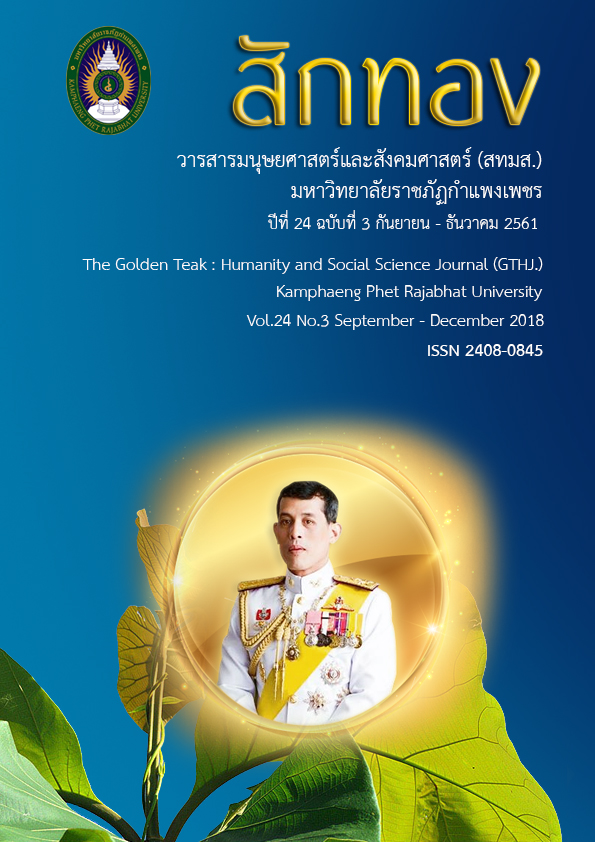Development of Administrative Competency Indicators of School Administrators under the Office of Private Education Commission
Main Article Content
Abstract
The objective of this study were 1. To study the management competency of these school administrators Under the Office of the Private Education Commission 2. To develop competency indicators of school administrators. Under the Office of the Private Education Commission, by Using quantitative research. There are 2 phase of the research methodology 1) To study the management competencies of the school administrators Under the Office of the Private Education Commission 2) To study the competencies indicators of school administrators. Under the Office of the Private Education Commission. The statistics used in the research were confirmatory factor analysis. The research found of the study showed that management competency indicators consisted of 10 components, 24 indicators as follows (1) building motivation aspect consists of 2 indicators (2) having vision consists of 2 indicators (3) leadership consists of 3 indicators (4) communication consists of 2 indicators (5) ethics and morality consists of 3 indicators (6) teamwork consists of 3 indicators. (7) analyzing of business consists of 3 indicators (8) managing human resource consists of two indicators (9) resolving conflict consists of 2 indicators and (10) developing employee consists of 2 indicators. The most weighted element is Leadership. Analyzing of business. Resolving conflict. Developing employee. Managing human resource. Building motivation. Teamwork. Communication And Moral ethics, respectively.
Article Details
บทความที่ได้รับการตีพิมพ์เป็นลิขสิทธิ์ของวารสาร สักทอง : วารสารมนุษยศาสตร์และสังคมศาสตร์ สถาบันวิจัยและพัฒนา มหาวิทยาลับราชภัฏกำแพงเพชร
ข้อคิดเห็นใดๆ ที่ปรากฎในวารสารเป็นวรรณกรรมของผู้เขียนโดยเฉพาะ ซึ่งมหาวิทยาลัยราชภัฏกำแพงเพชรและบรรณาธิการไม่จำเป็นต้องเห็นด้วย
References
Chaiyaset, P. (2007). Conflict management in the organization. Bangkok : Offset Creation.
Chonticha, H. (2011). The conflict resolution of characters in prose drama. Philosophy Thesis Doctor of Philosophy, Silpakorn University.
Chuchai, S. (2007). Recruitment, selection and evaluation of personnel performance. (2 nd ed.). Bangkok : Chulalongkorn University.
Davies, B. & L. Ellison. (1997). School Leadership for 21th Century : A Competency and Knowledge Approach. NewYork : Routledge.
Delmont, T.J.A. (2002). Competency Model for the Position of Chair/Head of an Academic Unit at the University of Minnesota. [Online]. Available : http://www/umn.edu/ ohr/adp/heads, [2015, August 8].
Duangjai, C. (2008). Risk management in basic education schools. Thesis Doctor of Philosophy Silpakorn University.
Kanungnit, T. (2010). The relationship between leadership styles and conflict management of Local government organization Doi Saket District Chiangmai Province. Independent research Master of Public Administration Chiang Mai University.
Mallwee Rozlof. (2011). Development of good schools in sub-districts through the process of network partners in Thailand. Ph.D. thesis Silpakorn University.
Mc Cleland, D.C. (1973). Test for Competence, rather than intelligence. American Psychologists, 28(1), 1-14.
Narongwit, S. (2007). Let's get to know COMPETENCY. (3 rd ed.). Bangkok : HR Center.
Nissadar, V. (2007). Competency Model and application in Thai organizations. Bangkok : Graphico Systems.
Office of the Civil Service Commission. (2003). Workshop to collect data Competency. Bangkok : Office of the Civil Service Commission.
Office of the National Anti-Corruption and Counter Corruption Commission (NCC). (2004). Corruption (Revision No. 1). (Type 7). Bangkok : Chuan Pim.
Office of the Teacher Civil Service Commission and Educational Personnel. (2005). TEPC Office Announcement, Subject Standards for teacher civil service and educational personnel. Bangkok : Office of the Board Teacher civil service and educational personnel.
Prakob, K. (2000). The role of school administrators in educational reform. Bangkok :Office of the National Education Commission.
Prakhon, R. (2008). Leadership characteristics of administrators in an effective educational institution. Thesis Doctor of Education Degree Silpakorn University.
Punnada, P. (2014). The development of the leadership model for the head of the receptionist Airplanes based on the application of a full-fledged intellectual education base in the airline. Doctor of Philosophy Thesis Silpakorn University.
Secretariat of the Teachers Council of Thailand. (1998). Teacher Ethical Behavior Model 1996. Bangkok : Wattana Panich.
Senge, P.M. (2000). School That Learn. New York : Currency Doubleday.
Somchai, T. (2000). Professional managers. Journal of Teacher Civil Service, 20(3), 20-23.
Spencer, L.M. & S.M. Spender. (1993). Competence At Work : Model for Superior Performance. New York : John Willey and Sons.
Supakorn, I. (2010). Case study of causes of conflict in subdistrict administrative organizations in the district Dan Khun Thot, Nakhon Ratchasima Province. Thesis, construction management and public utility Suranaree University of Technology.
Tedpong, C. (2002). Meeting documents on the policy of private education management : Undergraduate level. Bangkok : Suwiriyasat Printing.
Thipwan, S. (2014). Development of policy proposals for enhancing creative leadershipFor organization leaders, students/students in higher education institutions in the next decade (2014-2023). Doctor of Philosophy Thesis Silpakorn University.
Thira, R. (2007). Professionalism in organizing and managing educational reform era. Bangkok : millet.
Wanchai, B. (2005). Research report: Needs for the development of key competencies of executives Educational institutions according to the guidelines for bureaucratic reform and educational reform. Ubon Ratchathani : Ubon Ratchathani Educational Service Area Office 4.
Weber, M. (1946). From Max Weber : Essays in Sociology. Translated by Gerth, H.H., and Mills, W.C. New York : Oxford University Press.


